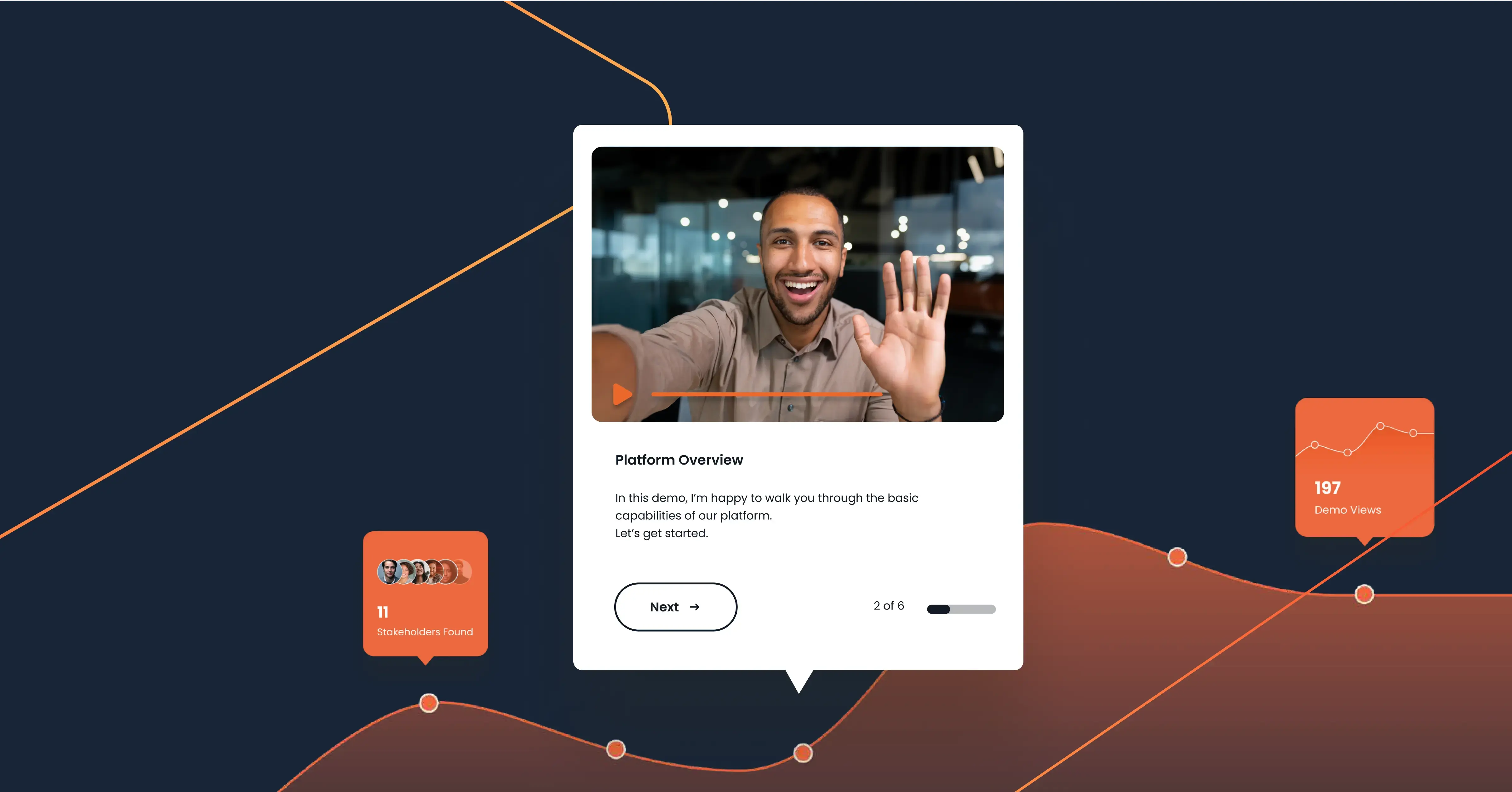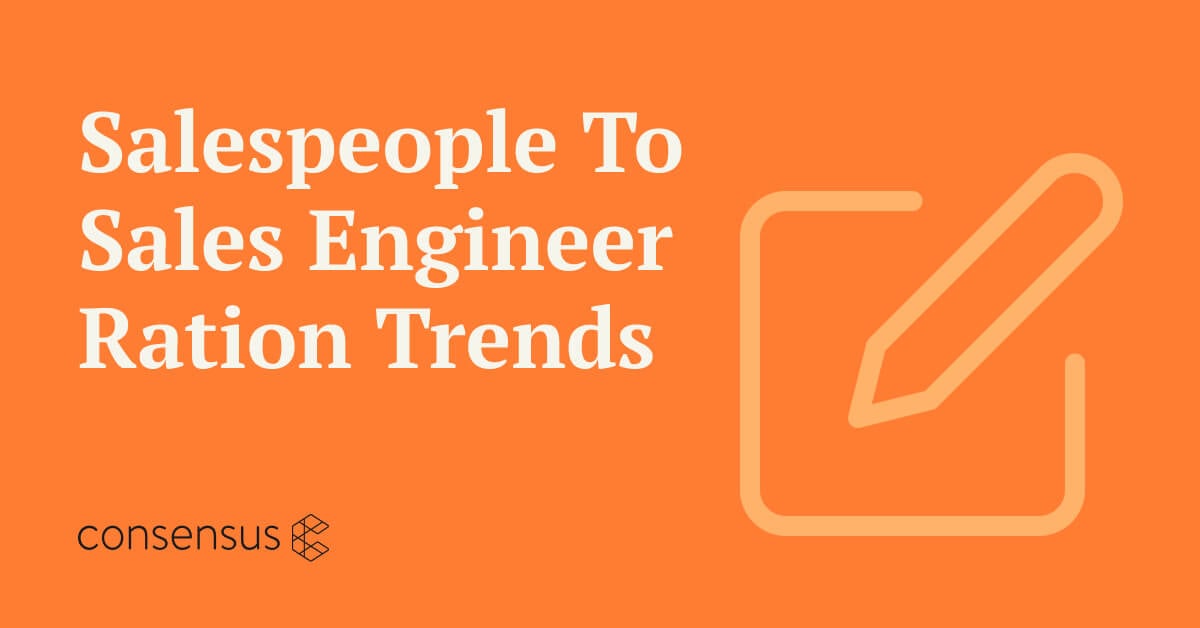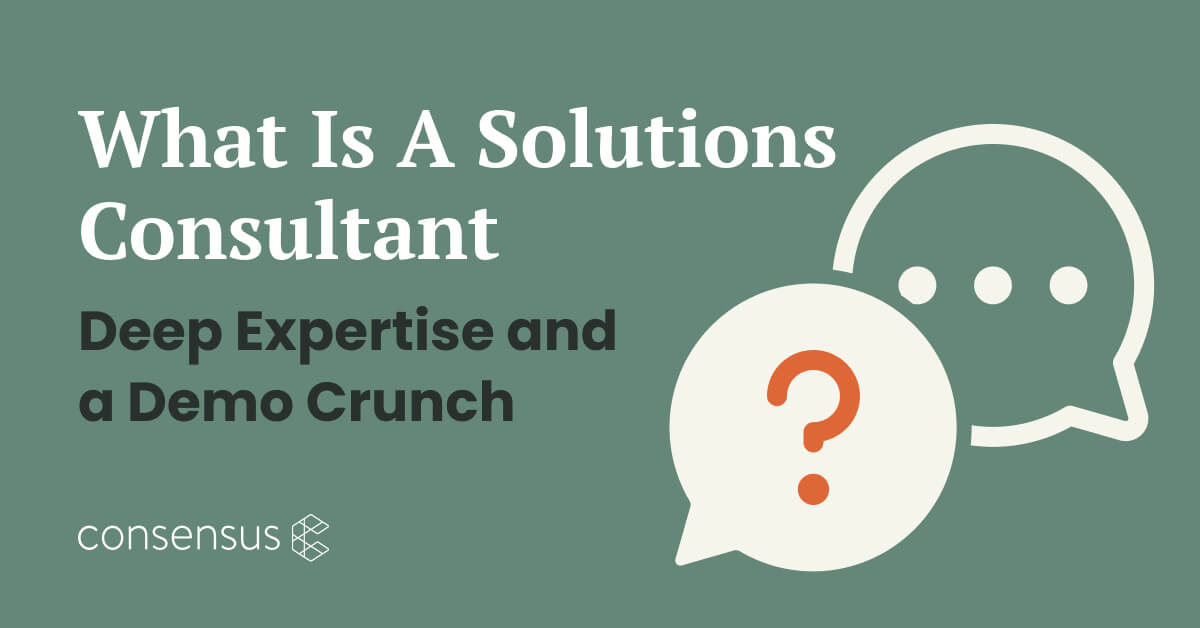Todd Janzen is a lifelong advocate for the Sales Engineering profession and a true engineer at ...
Close more deals with
Demo Automation.
Watch a Demo
B2B buyers want more than just a sales pitch. They need someone who understands both the technical complexities of a product and how to solve real business problems. And sales engineers (SEs) are the answers to both of those challenges.
While traditional salespeople focus on relationships and closing deals, sales engineers go deeper. They combine deep product knowledge with consultative selling skills to close complex technical deals. And as B2B deals grow larger and more technical—and with an average of six to 10 stakeholders—the future of presales suggests that sales engineers are becoming the driving force behind complex B2B sales.
I’m extremely passionate about the sales engineering profession and consider myself a lifer. I thrive on working with diverse people, solving complex problems, and building things that scale, from when I was leading Salesforce’s global Solutions shared service to my current role as SVP of Buyer Enablement & Customer Success at Consensus.
For me, efficiency isn’t just a goal—it’s an obsession. Why? Sales engineers are being pulled in different directions—which can lead to some serious challenges. But, with new tools being created to help us with demo preparation, demo deflection, and deal management, we’re seeing a shift in how we operate. The role is quickly evolving, placing SEs at the forefront of a new type of presales—one where data-driven insights and automation enable us to focus on what we do best: solving problems, guiding buyers, and accelerating deals.
Let’s break down the quickly-evolving sales engineer role, required skills and qualifications, and how data is elevating SEs into strategic dealmakers.
What is a Sales Engineer?
A sales engineer, or solution engineer, is a technical expert who knows how to explain difficult concepts in ways that resonate with both internal teams and external buyers. Think of them as multi-lingual technical translators. While traditional salespeople focus on relationship-building and boosting their win rate, we dig into the technical details that can make or break deals.
The role continues to evolve as buying committees grow. More decision-makers mean more conversations earlier in the sales process. Sales engineers now lead technical discovery, product demonstrations, and solution design—becoming the primary drivers of enterprise sales success.
According to the Consensus Sales Engineering Compensation and Benchmark Report, the typical deal size for nearly 80% of sales engineers reaches almost $100,000.

Sales Engineer Career Opportunities
SEs come in many forms, each bringing a unique mix of technical expertise, business acumen, and customer engagement skills. While all SEs share a common goal—helping buyers understand and adopt complex solutions—the way they operate can vary significantly based on their industry, product focus, and team structure. Some are deeply technical, while others excel at storytelling and customer advocacy.
- Presales Engineer: These sales engineers are key players in getting deals going, providing sales teams with the tools and knowledge they need to connect with potential buyers. They prepare and present product demos, are product and industry knowledge geniuses, and perform in-depth buyer discovery.
- Post-sales Engineer: A sales engineer’s job isn’t done when a deal closes—especially if you’re a post-sales engineer. Post-sales engineers help customers onboard and get the most value out of their purchase, including overseeing installation and maintenance, managing customer relationships, and creating documentation to support onboarding.
- Solutions Engineer: A solutions engineer typically focuses on a specific industry and helps companies find the right technology solutions to their problems.
- Channel Sales Engineer: This type of sales engineer works with channel partners to ensure they have the right marketing materials, product information, and pricing to make a sale, working as a go-between for technical workers and business professionals.
- Sales Operations Engineer: Sales operations engineers design and implement sales strategies to make sales processes and operations more efficient.
- Field Sales Engineer: A field sales engineer works with clients to collect data and address technical issues.
- Applications Engineer: An applications engineer works with clients to design, install, and optimize computer systems.
Key Responsibilities
Sales engineers take on multiple roles and responsibilities, including:
- Consulting with customers and prospects to identify challenges, pain points, and use cases and provide solutions
- Developing in-depth product and industry knowledge
- Troubleshooting and solving technical issues with their product
- Effectively communicating how their technology solves customer problems and delivers measurable ROI
- Meeting buyer expectations through personalized product experiences
- Navigating complex buying groups to connect with the right stakeholders
- Communicating with sales teams to provide them with the information, content, and tools they need to close their deal
- Connecting with product teams to offer customer feedback
- Demonstrating their technical expertise and credibility to earn customer trust and influence purchasing decisions
- Establishing customer relationships both before and after a sale
The challenge with sales engineering is that responsibilities aren’t removed from our roles—they get added to. That means we have to do everything above, faster, in a way that maximizes efficiency without sacrificing quality or customer experience.
Time management is a very important skill for SEs to have. But we can’t do it alone. Fortunately, technology like Consensus saves SEs significant time by automating repetitive demos, eliminating demo lag, and qualifying prospects before live calls. Buyers can access demos on demand and share them with internal stakeholders, reducing the need for multiple calls. And with Demolytics, SEs gain insights into buyer engagement, allowing them to tailor live demos and avoid unqualified meetings.
This not only scales presales capacity but also ensures SEs focus on high-value deals instead of routine tasks. Plus, with 41% of demo views happening outside business hours, SEs effectively “sell while they sleep,” maximizing efficiency without additional effort.
Sales Engineer Career Overview
Sales engineers are the technical backbone of complex B2B sales. They translate intricate product features into clear business value for buyers. While traditional salespeople focus on relationships, sales engineers handle the technical heavy lifting that helps close enterprise deals.
According to our 2025 Sales Engineering Compensation and Benchmark Report, about 93% of respondents reported that sales engineers are the ones who perform product demos at their company. Sales engineers also tend to perform deeper technical discovery than other sales professionals—so it’s no surprise that sales engineers also reported that they spend the majority of their time on demo and discovery tasks.
The role continues to evolve as buying committees grow more technical. Sales engineers now lead product demonstrations, technical discovery, and solution architecture—making them central to revenue generation in software and technology companies.

Want to learn about key industry trends, salary benchmarks, and how SEs are prioritizing their time?
Download our 2025 Sales Engineering Compensation and Benchmark Report
Education and Training
Most sales engineers start with a bachelor’s degree in engineering (Guilty–go Cal Poly!), computer science, or similar technical fields. And historically, sales engineers have had a background as implementation consultants.
However, just because you may have a degree or experience in a different field doesn’t mean you can’t become a sales engineer. The best sales engineers combine deep technical knowledge with sharp business acumen and communication skills, which may come from a variety of different backgrounds.
For instance, someone with a marketing degree might find that they have the perfect skill set to bridge the marketing-sales divide, providing them with a unique perspective as a sales engineer. We’re also seeing a lot of customer success people using the communication and interpersonal skills they’ve developed to become great sales engineers.
Product expertise comes through hands-on training and certification programs, so it’s important to embrace being a lifelong learner. The tech world moves quickly, and sales engineers need to be prepared to move with it. Sales engineers learn to master demo environments, understand integration requirements, and solve complex technical challenges. They can also develop consulting skills to guide buyers through technical decisions.
Salary
The median annual salary for sales engineers as of 2023 sits at about $117,000, according to the U.S. Bureau of Labor Statistics (BLS). This is on par with our findings in our 2025 Sales Engineering Compensation and Benchmark Report, where surveyed SEs reported between $90,000 and $200,000, with the average salary being about $124,000.
Salary: ~Average $124,000
However, salaries aren’t the only way sales engineers are paid. Our report also found that the average commission earned by a sales engineer in a year sits at over $40,000.

Job Outlook
The market for sales engineers keeps growing. The BLS projects 6% growth by 2033, outpacing the national average for all occupations.
According to the BLS, this growth is attributed to an increasing number of technologically advanced products and services. As technology becomes more complex, we need more sales engineers who can make sense of it all and demonstrate the value of that tech to potential buyers.
Employment growth for sales engineers is particularly strong for selling computer hardware and software, as well as computer systems design and related services.
Of course, scaling presales efforts isn’t just about hiring more people—it’s about leveraging the right sales technology to support them in their efforts and maximize their impact.
Product Experience Platforms like Consensus empower SEs to work smarter, not harder. By automating repetitive demos, capturing buyer intent data, and enabling prospects to self-educate, SEs can focus on high-value activities like technical discovery and strategic consultations. This means fewer bottlenecks, more engaged buyers, and a presales team that can support a growing sales organization without burning out.
Companies that combine skilled SEs with the right technology can scale efficiently, reduce demo lag time, and increase sales velocity—helping them close more deals while making their lives a bit (read: a lot) easier!
Important Sales Engineer Skills
Sales engineers need two distinct skill sets: deep technical knowledge and the ability to explain complex ideas simply. And as buying committees grow more educated, mastering both becomes critical to closing enterprise deals. Gartner has found that 77% of B2B buyers say that their last purchase was extremely complex or difficult–and that today’s typical buying group involves six to 10 stakeholders, each of whom have consulted four to five sources of information.
Here are some critical hard skills that SEs use to streamline the buying experience.
Hard Skills
Hard skills give sales engineers the technical foundation to guide complex purchases. Here’s what you need to know to succeed.
Technical Expertise
Sales engineers understand how products work at a deep level. They know system architecture, integration requirements, and technical limitations. Plus, they can speak the language of engineering while maintaining business context.
For SEs to succeed, they need to showcase their technical knowledge and establish credibility, building trust with customers and guiding them toward confident purchasing decisions. This is especially challenging in large software companies, where vast product portfolios and intricate platform stacks require SEs to stay constantly updated, quickly adapt to new technologies, and navigate an ever-expanding knowledge base.
Product Knowledge
Knowing every feature isn’t enough. Sales engineers also understand how each capability solves specific business problems. They configure solutions to match buyer needs, deliver real ROI—and also set realistic expectations about what’s possible. A sales engineer can’t just say “yes” to everything a customer asks. There’s a huge personal risk in buying the wrong software, and a buyer’s reputation can be damaged if they choose the wrong vendor. Managing expectations and saying “no” is a mark of credibility and truthfulness.
Sales Experience
The best sales engineers know how to close deals. They qualify opportunities, handle technical objections, and partner with account executives to drive revenue, highlighting the power of negotiation to secure complex agreements. Sales experience helps them focus on the features that matter most to buyers.
Data Analysis
Numbers tell the story. Sales engineers analyze system requirements, usage patterns, and performance metrics to recommend the right solutions. Data-driven insights help buyers make confident decisions.
It’s also helping SEs focus our time on what really matters. With the rise of software that’s helping us prep and deflect demos, manage deals, and track buyer engagement, we’re getting a ton of new data.
How do you make sense of all this data? Consensus’ Demolytics tracks how buyers engage with demos. It provides real-time intent data that helps sales engineers better qualify and interact with leads. They can view stakeholder insights including demos sent, organic stakeholders discovered, discovery rate, views, view rate, features/sections selected, and docs downloaded.

This data provides deeper visibility into buying behaviors, helps prioritize high-value opportunities—and is raising the status of SEs to strategic revenue drivers within their organizations.
Soft Skills
Sales engineering is about trust, partnering for success, giving your best yes, and getting things done.
Written and Verbal Communication
Sales engineers translate technical jargon into plain language that resonates with both IT teams and business leaders. They’re both listeners and storytellers, able to convey the value of their product through meaningful conversations.
Presentation Skills
Presentations close deals. Sales engineers deliver product demos that show exactly how solutions solve specific problems. They adapt their message for different audiences—from developers to C-suite executives—while maintaining technical accuracy.
Problem-solving Capabilities
Sales engineers face new challenges daily: a buyer needs an unusual integration or a technical objection threatens to derail a deal. The best sales engineers stay calm, analyze the situation, and find creative solutions in collaboration with other departments.
They work with product teams to provide feedback on feature requests, partner with customer success to ensure smooth implementations, and coordinate with marketing to refine messaging based on real-world customer pain points. By aligning with different teams, SEs don’t just solve problems—they proactively remove roadblocks for current and future buyers.
Customer-centric Focus
Buyers want partners, not vendors. Sales engineers build trust by listening to problems, responding quickly to questions, and following through on commitments. The best sales engineers are customer-centric and can put themselves in the buyer’s shoes. That empathy builds strong relationships, which lead to larger deals and renewals.
They also need to be agile and responsive to customers’ needs—often within compressed timelines. And these customers may be stakeholders with diverse needs and priorities. Sales engineers must effectively navigate these complex groups and build consensus.
Interdepartmental Collaboration
Sales engineers work across multiple teams to ensure deals move forward smoothly and customers see long-term success. Their ability to collaborate across departments makes them a critical force in the sales process. Successful SEs partner with:
- Sales Teams: Work closely with AEs and SDRs to qualify opportunities, deliver technical demos, and handle objections that could slow down or stall a deal. SEs provide the technical expertise that helps sales teams sell with confidence.
- Product & Engineering Teams: Gather customer feedback on product limitations, advocate for key feature requests, and help engineering understand real-world use cases. SEs ensure product roadmaps align with customer needs.
- Marketing Teams: Assist in crafting messaging that resonates with technical buyers, contribute to content like whitepapers or case studies, and provide insights on which product features matter most to prospects.
- Customer Success & Implementation Teams: Ensure a smooth post-sale transition by sharing key technical details uncovered during presales, helping set customers up for successful onboarding and long-term adoption.
- Support & Security Teams: Collaborate on addressing customer concerns around integrations, compliance, and security requirements to remove obstacles before they become deal-breakers.
- Channel & Partner Teams: Enable resellers and partners by providing technical training, answering product-related questions, and ensuring third-party sellers can effectively position the solution.
Sales Engineering Challenges
Sales engineers play a crucial role in complex sales cycles, but their job comes with unique challenges. Here are some of the biggest obstacles they face:
- Managing Limited Bandwidth & High Demand: With a typical 1:5 ratio of SEs to AEs, SEs often juggle multiple deals at once, leading to time constraints. Plus, responsibilities aren’t getting removed from sales engineers’ plates—they need to handle more work, faster, without sacrificing quality. Automating demos with platforms like Consensus helps free up SEs to work on high-value activities.
- Handling Complex Buying Committees: SEs often navigate 6-10+ stakeholders with varying technical expertise, priorities, and objections. They must be agile and responsive to all the stakeholders’ needs to help build consensus—often within compressed timelines.
- Feeling Burned Out: According to our Sales Engineering Compensation & Workload Report, misallocating time and resources, wasting time on unqualified demos, high workloads, and inefficient workflows can all lead to burnout for presales teams.
- Proving ROI Beyond Features & Functions: They need to not only effectively communicate how their product solves customer problems but also show how it delivers measurable ROI. This means being able to quantify how the solution impacts revenue, efficiency, or risk mitigation.
- Receiving Different Compensation Structures than Sales: SEs play a critical role in closing deals, yet their compensation often doesn’t match that of their sales counterparts. According to our 2025 Compensation and Benchmarking Survey, sales engineers believe receiving more recognition for contributions would have a positive impact. They want the same perks and incentives offered to sales teams to reward their impact on deal success, retention, and expansion.
Keeping Up with Evolving Technology & Industry Trends: SEs must stay ahead of industry shifts, competitor advancements, and product updates to maintain credibility with customers. Continuous learning and collaboration with product and engineering teams are essential.

Thankfully, tools like demo automation software and AI-powered sales assistants help automate manual SE tasks and give them back their very valuable time. Of course, meeting all of these challenges requires a balanced approach. Sales engineers need to stay current on technological trends while developing their business acumen and improving their interpersonal capabilities. The role demands continuous learning—but offers significant rewards for those who master both technical depth and sales skills.
Work With Sales Engineers To Optimize Your Presales Efforts
Sales engineers do more than support your sales team—they drive revenue and guide buyers through complex decisions that close deals faster. As an engineer to the core—both by education and profession—I thrive on solving complex problems, working with diverse people, and building scalable solutions. This ensures a smoother sales cycle, minimizes friction, and helps accelerate deal velocity.
If you’re as passionate about the future of presales as I am, check out the most comprehensive Sales Engineering report in the industry.
Download Our 2025 SE Compensation and Benchmarking Report
The role varies by company size and product complexity. In smaller organizations, sales engineers might handle everything from demos to implementation. Larger enterprises often split the role between technical specialists and solution consultants. Plus, many sales engineers transition between presales and sales leadership as their careers progress.
If you enjoy solving problems and explaining complex ideas, you’re already halfway there. Many successful sales engineers started as developers, IT professionals, or technical support specialists. The key is learning to translate technical features into business benefits that resonate with buyers.
Your education path depends on your target industry. Software companies value coding experience and system architecture knowledge. Manufacturing firms need mechanical or electrical engineering backgrounds. And while certifications help, a proven ability to solve technical problems while driving revenue speaks louder than credentials.
Then, certifications can complement your experience—not replace it. Focus on programs that add immediate value to your current role or target position. Professional certifications boost your credibility and effectiveness as a sales engineer. Technical certifications from AWS, Microsoft, or Cisco demonstrate platform expertise. Sales certifications like the Certified Professional Salesperson (CPSP) certification strengthen your consultative selling skills.
Start with certifications aligned with your industry and products. Cloud platforms? Get AWS or Azure certified. Network solutions? Pursue Cisco or CompTIA credentials.





